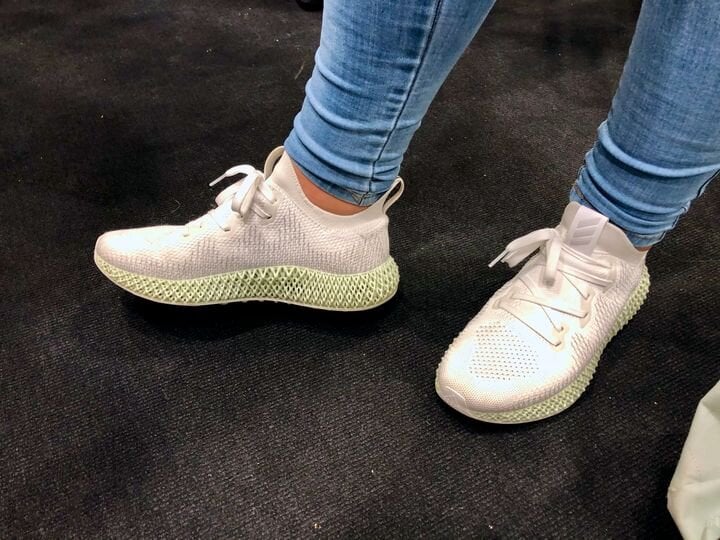![Partially-3D printed shoes [Source: Fabbaloo]](https://fabbaloo.com/wp-content/uploads/2020/05/image-asset_img_5eb08c0de5b18.jpg)
Dassault Systèmes has undertaken a survey to understand consumer attitudes to custom-made products.
This is critically important to the world of 3D printing, which could grow exponentially if consumers become accustomed to and frequent buyers of personalized products. The physically customized products, of course, are highly enabled by 3D printing technology that can manufacture objects on demand. Well, if you’re willing to wait for a few hours, anyway.
This category would include such things as: 3D scans of feet to develop custom shoes; 3D scanned faces to prepare custom-fitting eyewear; and so on. Anything that fits better if personalized could fit into this approach.
While several 3D printing companies have experimented in this direction, there hasn’t yet been any huge booms, but things are still promising. One question that looms over these ventures is whether the public would consider such products.
The products are somewhat more expensive than traditional mass-manufactured products. They may be delivered faster, but might require buyers to be subjected to 3D scans that take longer than the normal buying experience. In addition, the kiosk approach normally employed by these personalization experiments usually requires personal data being sent aloft into the cloud for processing, which is a possible security concern.
Dassault Systèmes Consumer Survey
Dassault Systèmes undertook a survey of 3,000 individuals located in China, France and the USA to understand their thinking on these topics. Let’s review the most important and relevant findings and see what each means:
“Consumers want personalization but don’t want to wait for it. Eighty-three percent of consumers expect products or services to adapt in a matter of moments or hours. Only 21% will wait four or more days for a personalized product or service to be delivered.”
This is good and bad news. It means that kiosks likely have to include production machinery (3D printers and more), and the idea of centralized production is not going to work very well. Good for 3D printer manufacturers, but not so for 3D print services.
“Consumers are willing to pay on average 25.3% for personalization. In return, they expect to be compensated with an average of 25.6% savings for giving out their data. They are more willing to pay for personalized healthcare; less so for personalized retail.”
This is critically important as it sets a bar for pricing. With this information anyone attempting a customized product can engineer their system and process to achieve that price level and be reasonably assured of success. It also means that those ventures whose prices are beyond a 25% premium should probably rethink what they are doing.
“Industry has an opportunity to clearly define personalization. Consumers have a mixed definition of personalization. More than 50% define it as products/services they customize before purchasing, and as products/services selected from a list of options, as well as products/services created based on personal data; 63% of early technology adopters define personalization as the latter.”
While this seems confusing, it could be of advantage to producers, who can call anything “customized”. But perhaps not so good for consumers who may expect more than they get.
“Consumers are most interested in personalized products and services that benefit health, such as personalized preventative health plans based on behavior, and alert systems for falls.
Personalization for personal safety is also of interest to consumers, such as products that notify of time-sensitive home emergencies, crime alerts based on location, and sending their location to police during times of safety concerns.”
I’m not sure how these translate into physical products that could be made by 3D printers, but surely there are some ideas that could be developed. This is perhaps an opportunity for those with some new ideas to pursue.
“Data privacy is a concern for 96% of consumers. Most consumers will only share data they agreed to share in exchange for personalization, yet anonymizing data will make six out of 10 respondents more willing to share. Eighty-eight percent will discontinue a helpful personalized service if they are unsure of how their data is being managed. For 68%, consumer demands will lead to data protection.”
This doesn’t sound like good news for 3D printed custom products, as by definition the information will be associated with the individual. However, it also means that companies offering such personalized products must engage in very stringent security practices and transparency.
“Personalization expectations differ among generations. Generation X, millennials and Generation Z are more comfortable sharing data for better personalization and are more likely to agree on the personal safety, time and monetary benefits it brings than baby boomers and the silent generation. Sixty percent of baby boomers are most excited about personalization in healthcare, 24% of Generation Z about mobility, and 21% of millennials about the environment.”
This is important information for those developing customized products.
We’ve only seen a very few personalized product systems emerge, but the survey results above hint at the kind of barriers ventures must overcome in order to be successful. I’m sure some will.

